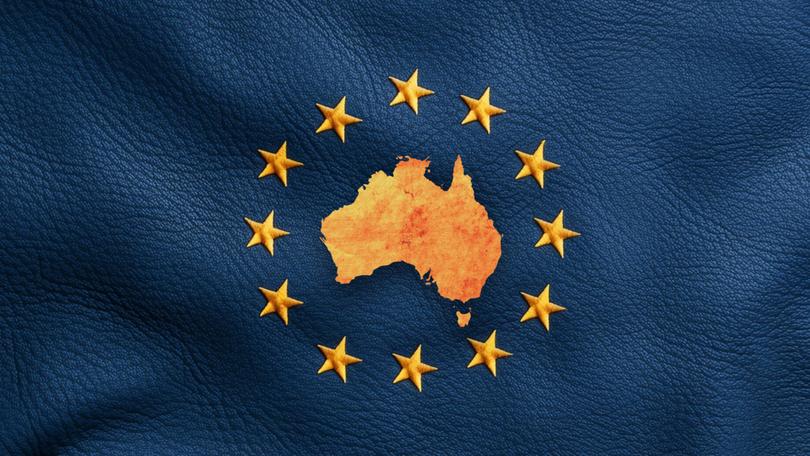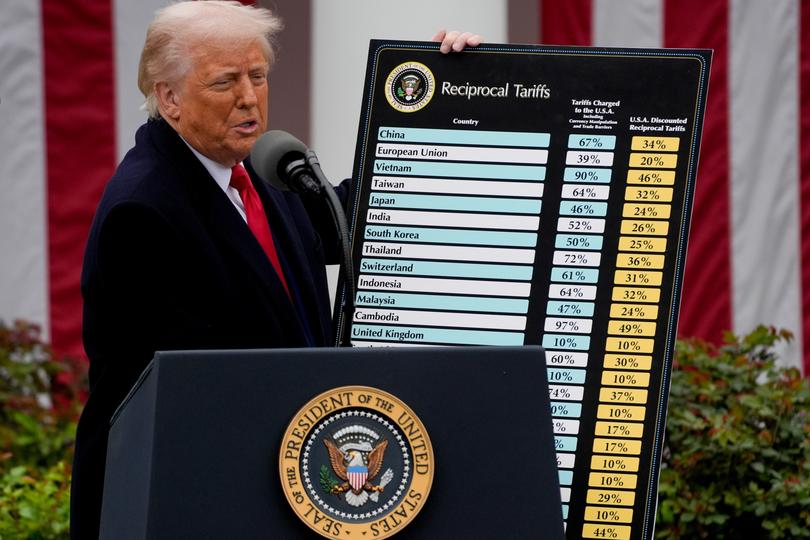Australia-European Union trade deal talks revived by Donald Trump’s tariff action, deal should be a priority
EXCLUSIVE: The Nightly can reveal that collapsed talks over a trade deal between Australia and the European Union could resume, a result of Donald Trump’s actions.

Donald Trump has breathed new life into a trade deal between Australia and the European Union with hopes that negotiations on reviving the collapsed talks could resume as early as May, The Nightly can reveal.
The US President caved to pressure and lowered the tariffs on most countries except for China to 10 per cent on Thursday.
Because Australia was already slated for a 10 per cent tariff imposition, despite having a free trade agreement with the US, his reversal effectively means there is no change for Australia, government sources confirmed.
Sign up to The Nightly's newsletters.
Get the first look at the digital newspaper, curated daily stories and breaking headlines delivered to your inbox.
By continuing you agree to our Terms and Privacy Policy.In a post on social media, President Trump said that the tariffs would be raised to 125 per cent on China because it has responded with reciprocal measures but that they would lowered, “effective immediately” to the baseline of 10 per cent for everyone else, because they had showed a willingness to make a deal.

But the Trump Administration’s erratic and often punitive approach caused shock amongst the United States’ traditional allies, including Australia, and spurred a fresh attempt at trade diversification that was first triggered after the COVID pandemic and China’s economic coercion of Australia.
On the day of President Trump’s so-called “Liberation Day,” Australia singled out the European Union, one of the world’s largest economies, which accounts for around 14 per cent of the world’s trade in goods, as a priority target for opening up new trade routes.
Trade Minister Don Farrell had a first call with his new European counterpart overnight. The discussion between Senator Farrell and the EU Trade Commissioner Maroš Šefčovič lasted 60 minutes and was hailed by both sides as extremely positive.
The pair agreed that both sides should meet as soon as possible after the federal election on May 3.
Senator Farrell told The Nightly on Thursday: “I had a very warm and constructive meeting with my EU counterpart and we have agreed to fast track a resumption of negotiations for a free trade agreement.”
Olof Gill, spokesman for Commissioner Šefčovič said the video call was “positive and constructive”.
“They discussed a possible timeline and the broader context for revisiting EU-AU FTA negotiations and bringing them across the finish line for the benefit of both sides,” Mr Gill said.
Tim Yeend, former DFAT Associate Secretary who led negotiations when they broke down in 2023, told The Nightly the development was progress.
“This high level reengagement on the FTA is welcome,” he said.
“Cooperation between Europe and Australia has never been more important in current global conditions.
“And it could be a quick and much-needed win for both sides as the bulk of the agreement was finalised in 2023.
“As soon as the Australian elections are over, negotiators from both sides should start shaping commercially acceptable outcomes in the few remaining areas including, of course, agriculture.
“It is not an impossible task.”
Trade talks collapsed over beef quotas in 2023 and both sides walked away from negotiations indefinitely.
Both sides felt bruised after the negotiations came close to striking a deal but fell at the last hurdle over the EU’s refusal to allow in enough Australian beef and put the talks in the freezer indefinitely.
But in light of US President Donald Trump’s “Liberation Day” tariffs, some of which he has now said he will ease on allies following massive routs in stock markets worldwide, Australia has expressed hope that its relationship with the EU might strengthen.
Prime Minister Anthony Albanese said the US retreat vindicated his strategy.
“Overnight we’ve seen this change,” he told 4BC Radio in Cairns, where he is campaigning.
“What it does is show how important it is that my Government have continued to engage in a considered, adult, mature way, including with the Trump administration.
“We didn’t reach for any panic buttons.”
The EU has also said it wants to diversify its trading relationships and wants to accelerate that process.
Jason Collins from the European Australia Business Council said the development was a good one.
“Maros Sefcovic is known as a European leader who likes to get deals done,” he said.
“He has handled the EU’s relationship with the UK post-Brexit, so getting a deal done with Australia should be a priority order after the Australian elections if both sides appreciate their counterparts’ needs and limits.
“It’s been known from the beginning that agriculture would be the toughest issue to resolve, but the deal opens up massive opportunities across every industry and sector, so it’s in everybody’s interests that we find the solution and get this working for both sides.
“Closer economic ties with Europe is more important than ever before.”
The agreement to meet to resume talks after the election will benefit whoever wins, although polling suggests the Labor government will remain in power.
Given that Senator Farrell is one of the Prime Minister’s staunchest allies and is widely regarded as one of the government’s most competent ministers, it is likely he would continue in the job of Trade Minister if Labor is re-elected.
But should the Coalition win on May 3, the talks would also Opposition Leader Peter Dutton, who earmarked out a deal with the EU as a foreign policy priority in government in a major pre-election speech.
Trade talks have been ongoing since 2018.
The EU, which has 450 million consumers, was Australia’s third-largest trading partner in 2020.
The Australian Department of Foreign Affairs said two-way trade was worth $AU108.5 billion.

